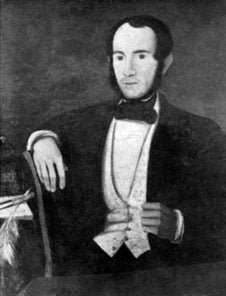
Early Life
Policarpo de Balzola was born on 26 January, 1813, in Irún, Basque Country, Spain. He was the third child of Miguel de Balzola Garamendi Emparanza y Arribalzagogesacoa from Guernica, a parish organist and choirmaster and María Josefa Iparraguirre from Irún, a cloth merchant (Policarpo had one older sister and a brother — Antonia and Felipe).
Miguel de Balzola Garamendi was born in Guernica in about 1760. His father, Miguel de Balzola Emparanza (a great-grandfather of the famous Spanish Basque composer Juan Crisóstomo Arriaga), was an organist and composer at the Church of Santa Maria de Guernica. Miguel Jr. succeeded his father’s occupation and in January 1780, he accepted the position of teaching organist and choirmaster in the Church of Santa Maria del Juncal in Irun. He worked as an organist in Irun for 37 years, leaving in June 1817, stricken with insult and paralysis. Miguel de Balzola died on 23rd April 1823.
Policarpo de Balzola finished elementary education in his hometown, where he was fond of arithmetic and geometry. After the death of his father in 1823, the family led a poor life, so he had to work, in order to pay for some lessons that were given to him by a military engineer, who came to repair the fortifications of Irun. From him, Policarpo learned some geometry, trigonometry, and drawing for a few months.
Career
In the early 1830s, Policarpo went to Madrid to take charge of a model farm established in the vicinity of the Court, under the protection of the State. He remained there until 1835 when he fell ill with pneumonia and was forced to leave his job and return to Irun in 1835. In 1837 he succeeded in getting the position of a escribano (a notary) in Burgos. Afterward, he was appointed a Secretario del Ayuntamiento de Irún (secretary of the City of Irun) and worked in various positions in his hometown until 1868.
From 1847 until 1850 he held the position of perito agrimensor (expert surveyor) in Tolosa, a job that allowed him to draw plans for small and large construction projects. In 1860s Balzola designed Paseo de Colón (the Main Street) of Irun.
He took part in the First Carlist War (1833–1839), as a member of the National Militia. In 1838 Policarpo de Balzola married Gabriela Echeverría y Ugalde from Irun, and they had four children: Isabel, Hermógenes, Valeriano, and Soledad.
In the 1840s, besides his calculating machine the ‘Teclado Aritmético’ an Arithmetic keyboard resembling a piano (see the calculating machine of Policarpo de Balzola), he also invented a mechanical perpetual calendar (el calendario perpetuo mecanico), a measuring device for surfaces and a scoring mechanism, and got a patent to sell it for 15 years.
In 1849, Policarpo de Balzola went on to become a key figure in the establishment of the metric system in the Spain and Basque Country. In 1853 he published a book (Aritmética con la explicación del Sistema métrico escrita por encargo de la Diputación de la M. N. y M. L. provincia de Guipúzcoa por Policarpo de Balzola) to spread the use of metric units. Besides this book, Balzola was the author of several other books on the metric systems, universal harmony, calendars, and other topics.
Policarpo de Balzola was a politically controversial but affable and funny character with a sense of humor, a good dancer, and his capacity for work and his passion for learning, always in favor of their community, still appear admirable.
Policarpo de Balzola died on 1 February, 1879, at his home in Irun. Not much is known about the cause of death.
The image featured at the top of this post is ©Unknown author / public domain
